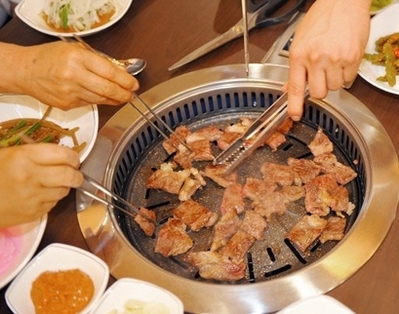SEOUL - South Korea's ruling party and the government said Sunday that they will postpone implementing new US beef import rules for the time being as the public remains concerned over US beef products, Yonhap news agency reported.
 South Koreans cook Korean beef at a restaurant in Seoul on June 20. Washington has confirmed a deal to add extra health safeguards on US beef exports to South Korea, and agreed not to export any cattle older than 30 months in a bid to avert mad cow disease. [Agencies]
South Koreans cook Korean beef at a restaurant in Seoul on June 20. Washington has confirmed a deal to add extra health safeguards on US beef exports to South Korea, and agreed not to export any cattle older than 30 months in a bid to avert mad cow disease. [Agencies] |
After negotiations in Washington last week, South Korean Trade Minister Kim Jong-hoon and US Trade Representative Susan Schwab agreed to take steps not to export beef from cattle over 30 months old.
The negotiations were in response to widespread public opposition to the April 18 deal in South Korea that opens the country's market to most US beef products.
"The details of the additional high-level talks will be fully explained to the public before any attempt is made to post the new US import rules on the government gazette," Yonhap quoted Grand National Party (GNP) spokeswoman Cho Yoon-sun as saying after a ruling party-government consultative meeting.
South Koreans have held candlelight rallies in Seoul and other major cities to protest the beef import agreement, demanding the government renegotiate it in consideration of public concerns over mad cow disease.
S. Koreans to continue protests
South Koreans opposing resumption of imports of US beef planned to hold candlelight rallies later Sunday in a show of discontent with Seoul's additional deal with Washington on beef safeguards, the Yonhap News Agency reported.
In April, Seoul agreed to import American beef from cattle of all ages, lifting a five-year-old ban that was imposed after a case of mad cow disease was found in the United States. The agreement angered many South Koreans who concerned about the safety of American beef.
Following week-long additional negotiations in Washington, South Korean Trade Minister Kim Jong-hoon announced on Saturday that US beef from cattle older than 30 months will not be exported to South Korea. He also said Seoul will ban some specified risk materials, such as spinal cords and heads, known to carry the greatest risk of transmitting mad cow disease to humans. However, critics described the additional deal with the United States as "deceptive."
In the additional deal, they said, the government failed to impose a blanket ban on specified risk materials, so tongues, the vertebral column, and intestines are still allowed. Also, the Quality Safety Assessment system that Washington promised to implement for beef exports to South Korea is only a privately- controlled restriction that is less effective than government- managed export verification systems, critics said.
About 10,000 people demonstrated in downtown Seoul on Saturday night, calling for a renegotiation with Washington to impose tougher quarantine rules. Organizers claimed as many as 60,000 people participated.
The overnight rallies turned violent in the predawn hours, as protesters confronted police who used a barricade of police buses to block them from marching to the presidential office Cheong Wa Dae, located just a kilometer away from the protest in Gwanghwamun area.

